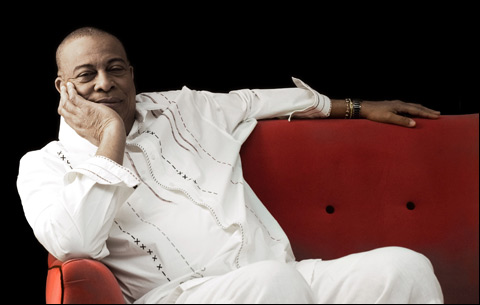
STEPPING OUT Coltrane, Zawinul, Jelly Roll Morton, and cha-cha-cha exist at once in Chucho Valdés’s music. |
Anyone who has doubts about the musical supremacy of Chucho Valdés — or wants an introduction to it — need only listen to "Danzón," the second track from the new Chucho's Steps (Four Quarter Entertainment). In this one piece, Valdés, a major figure in Cuban music for more than 30 years, shows what he can do with a deep-held traditional form, with a band, with the piano.
Like just about everything in Cuban music (or music, period), danzón is a hybrid, its roots in 19th-century ballroom. Valdés begins modern, goes back to the roots, comes back again, and makes something all his own. He opens with two chords that could come straight out of Bill Evans's introduction to Miles Davis's "Flamenco Sketches," then sweeps upward with a rhapsodic statement from tenor-saxophonist Carlos Hernández and a quick percussion-driven dance figure. The combination of Valdés's full-chord harmonies and Hernández's tenor recalls Ellington, especially as the written melody arrives full circle.
Then comes a deathless cha-cha-cha from percussion and bass as Valdés begins his solo. Even as that core dance rhythm is laid down, his fleet melodic lines begin to melt the bar lines, then shift back into hard rhythmic chords and powerful two-handed flurries. The drums and bass keep your feet moving in time, but Valdés's piano sets your head spinning. Before long, his hands are flying with poised independence — fast runs in the right while the left spells spare parallel melodies. If epiphany is the sensation of perceiving the simultaneous multiplicity and unity of all things, then "Danzón" fits the bill.
The suite-like structure of "Danzón" is common throughout much of Chucho's Steps. Each piece explores different tempos, themes, moods, and styles. "Begin To Be Good" combines Cole Porter's "Begin the Beguine" with the Gershwins' "Lady Be Good" and a touch of Dizzy Gillespie's "A Night in Tunisia" in the melody and rhythm as well. "New Orleans (A Tribute to the Marsalis Family)" goes back through modern second-line rhythms (with its Cuban-derived clave beat) to Jelly Roll Morton. "Zawinul's Mambo" Cubanizes the tricky rhythms of the Weather Report pianist and composer's hit "Birdland" with a hair-raising tempo and a son-montuno interlude for trumpeter Reynaldo Álvarez. "Yansá" is the most "African" piece, digging into the Yoruban roots of the music, with percussion and raw vocals. And Valdés reconceives Coltrane's "Giant Steps" as "Chucho's Steps," with a vigorous workout for Hernández's tenor.
Valdés, who brings his Afro-Cuban Messengers to the Berklee Performance Center as part of the Celebrity Series October 28, was taught early on by his pianist father Bebo, himself a Cuban star. (The two collaborated on 2008's Juntos para siempre.) Learning popular standards and jazz from his father, Chucho studied classical piano at conservatory. By his mid 30s, he had founded the ground-breaking band Irakere and was famous.
Talking to me through a translator over a weak line from Havana, Valdés doesn't exactly answer my question when I ask him who the most important figures are in Cuban music. He tells me about the richness of the music, the Yoruban traditions, and santería. "It has hundreds of different rhythms — that's one of the features of Cuban music." So, whether or not he understood my question, he's answered it: Cuban music can't be boiled down to one thing or person.